Feb 22, 2026
Feb 22, 2026
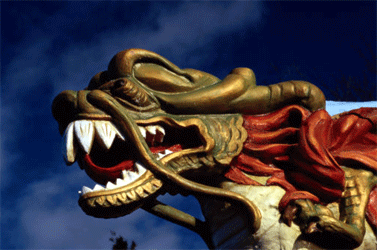 After my stay in Hong Kong I had only a few days of vacation remaining, which I wished to use to visit mainland China. I had an option to catch a train to Shenzhen, and then go on ahead towards Shanghai. Alternatively I could fly to Beijing and spend my time there.
After my stay in Hong Kong I had only a few days of vacation remaining, which I wished to use to visit mainland China. I had an option to catch a train to Shenzhen, and then go on ahead towards Shanghai. Alternatively I could fly to Beijing and spend my time there.
I decided to fly to Beijing. Shanghai, I was certain would be similar to Hong Kong. After Singapore and Hong Kong it was time for a change.
I flew by Dragon Air, a Hong Kong airline company which has a red, sinister looking dragon painted on the outside of the aircraft. It was a relatively short three and a half hour flight, during the course of which, for some time I watched a Chinese movie with lots of Kung Fu in it. It wasn’t sub titled in English, and so I gave up on it after a while and turned to reading ‘The Bridegroom’, a collection of short stories by Ha Jin, the celebrated Chinese-American writer and professor of literature at an American University.
We were requested to remain seated once our aircraft had landed. Within minutes a group of Chinese airport staff had entered the aircraft holding small, black guns in their hands. My heartbeat raced, and I almost panicked before I realized what they were up to. The elderly European lady sitting next to me was clearly very nervous on the verge of hysteria. The tension in the aircraft was palpable. All this could have been prevented by means of a simple announcement in English that was never made. Happily, we soon discovered that the guns were made of plastic and served a different purpose. A young Chinese lady placed the gun on my forehead and fired. She smiled. My temperature was thankfully normal – although I’m not sure if the same could be said about my blood pressure, or that of other passengers. I smiled back.
They didn’t find any H1N1 passenger abroad our flight and we were allowed to disembark. Immigration was efficient as it had been in Hong Kong and once I had passed through I had to take a short train ride from Terminal 3 a, the point of arrival to Terminal 3 e to collect my baggage.
I had asked Marlene, a helpful Chinese girl at my Hong Kong hotel to write out the name of my hotel in Beijing, the ‘Courtyard on Marriot’ in Chinese on a piece of paper. It had taken her almost half an hour to accomplish this small task. Seeing my bemused expression, she had explained that this was because in Hong Kong they spoke Cantonese whereas in Beijing, like most of China, it was Mandarin. I now gave this slip to a taxi driver outside the airport, he nodded his head and we were soon racing through the airport road towards Beijing.
If I was relatively unimpressed with Hong Kong it was because I possibly had higher expectations from the city. On the other hand from the very outset I was impressed with what I saw of mainland China, possibly because I had lower expectations. I had imagined that a quick makeover had been done for Beijing because of the Olympics, but that I was sure to discover crumbling ill kept edifices, potholes and other deficiencies in infra structure once I was out of the capital. (China’s polluting factories have received much publicity and doubtless this vast country has many poor areas where little has been done in terms of roads and facilities, but within a couple of hours out of Beijing at any rate all I could find was evidence of excellent maintenance and upkeep.)
The Underground was as impressive as the Over-ground. At Chong Wen tube station, that was a two-minute walk from my hotel it was easy to work out which train to take and where to change with clear instructions given on the underground map available in English. The hotel had therefore given me a slip of paper with about ten popular destinations listed in English together with the translation in Chinese. This was useful with taxis.
Few Chinese speak English, but courtesy the Olympics you can see the writing everywhere, be it the Underground, the Forbidden City, the Ming Tombs, or elsewhere.
Are the Chinese animal lovers, even if they eat dogs? It’s difficult to say, although Disneyland has recently received permission to open its first theme park in China. Glory Mall, next to Lady Glory Mall (!) very close to my hotel had a giant Mickey Mouse just outside as a kind of mascot, and a box placed below the plastic creature played a song in English. Western music played also at Kentucky Fried Chicken not far from my hotel. If I wanted greater variety within the American fast food establishment, I could go instead to a twenty four hours open MacDonald’s or Starbucks also close by.
At roadside magazine stalls, I was startled to find western magazines such as Femina, Health Magazine and even Hollywood magazines, but as I flipped through the pages I fond there was only the English title on the cover next to one in Mandarin. The contents inside: all in Chinese. The branding of these magazines as a West generated product was important. Chinese apparently have an avid interest and curiosity in Western culture, but do not as yet possess the intellectual or shall we say linguistic equipment to access it properly.
Dog Fan! I was surprised to see such a pet magazine selling at a roadside magazine stall in Beijing, a country where dog meat is still served up in many upmarket Chinese restaurants. Over the course of the next few days however I did see Chinese walk their dogs in some of the most posh areas of Beijing though I have to say that in terms of exotic specimens they did not match up to the pedigreed variety I had seen in Hong Kong. Also in Beijing the owners themselves seemed to walk their dogs; in Hong Kong’s posh areas it was maids and servants.
As a people, Chinese can be both rude and friendly. Every nationality and community on earth can be rude and unhelpful, but some are more likely to be so than others. With Thais, for instance, you can say that they are more likely to be friendly than rude, more helpful than unhelpful – not for nothing is Thailand called the Land of Smiles – but you cannot say this about the Chinese.
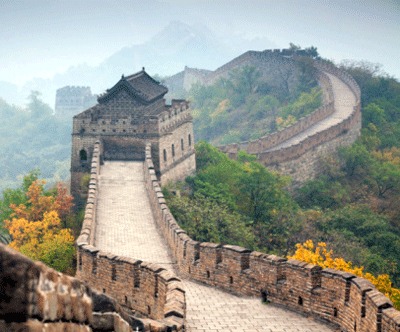 I realized this during a visit to the Great Wall. I didn’t have my camera on me but realized, as I stood below the spectacular edifice – the only man created structure that can be seen from the moon – that this was a visit I needed to have a recorded photographic memory of, to look at and reminisce as the years went by. The best option for me was to get photographed by one of the stall owners at the bottom of the structure with a view of the Wall behind me.
I realized this during a visit to the Great Wall. I didn’t have my camera on me but realized, as I stood below the spectacular edifice – the only man created structure that can be seen from the moon – that this was a visit I needed to have a recorded photographic memory of, to look at and reminisce as the years went by. The best option for me was to get photographed by one of the stall owners at the bottom of the structure with a view of the Wall behind me.
I dressed up in traditional Chinese warrior costume and after I had finished it occurred to me that it might be an idea to have a Chinese person next to me. Ideally I would have preferred a pretty, young girl, and there were a few of these milling around, but I didn’t want to risk getting misunderstood. I decided instead to ask a middle-aged woman running a soft drinks stall to pose with me.
'How much you pay?' she responded rudely.
'Nothing,' I replied, annoyed at her demand and the manner in which it had been made, and decided to have the photograph taken without her.
As I struck a pose, a Chinese group of students was just descending the stairs adjacent to the Wall and when they saw me, an Indian dressed in a Chinese warrior’s costume, they burst out laughing. Three girls raced up to me excitedly, and begged to be photographed with me! Much to the consternation of the money-grabbing middle-aged vendor, who glared malevolently.
I have never in my life experienced so many people laugh at me in such a spontaneous, but completely non-offensive fashion. It reminded me of an incident I had read somewhere, which I had not fully believed. The story is that when Marco Polo first met the Chinese emperor, his royal majesty could not contain his laughter. He, and the entire court burst out laughing. They had never seen such a strange looking man with to their mind such an absurdly large and long nose. And so I supposed in my Chinese costume I must have appeared strange to the Chinese students even in this modern day and age of jet set travel.
Hong Kong was not as crowded as I had expected, but in China I was certain that I would find crowds and hustle bustle.
Like most first time visitors on my very first day in Beijing I decided to visit the famous Tiananmen Square. There were crowds milling around, and Rose Lee, my slender guide asked me if I was amazed at the rush. ‘Not at all,’ I replied.
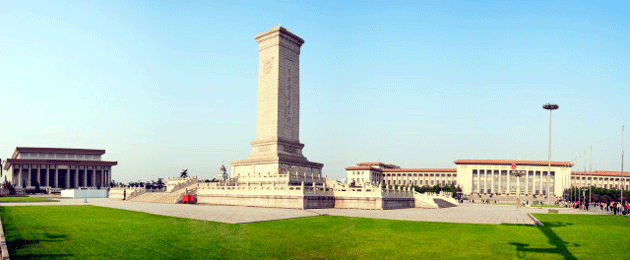
The flatness of Tiananmen Square is broken by only one large figurine depicting the revolutionary heroes who had brought about the communist revolution. This Monument to the People’s Heroes was similar to our own very similar monument near Teen Murti in New Delhi. Otherwise there were stately buildings that bordered the square. To the east was the National Museum of China and to the west was the Great Hall of the People.
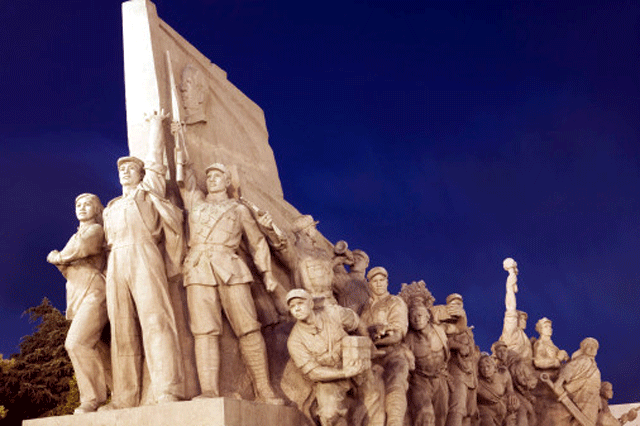
‘There is a magnificent banquet hall inside the Hall,’ said Rose with evident pride, ‘that can cater to three thousand guests at a time. It is generally not open to the public but I’ve had the chance to go in once.’
 We turned to walk towards the Forbidden City which lies just next to the square, and from whose ramparts Mao had announced the revolution. Inside there were wonderful palaces and gardens full of rocks and stone. The Chinese mystic Lao Tzu wrote that in the battle between water and stone, in the end it was water that was victorious. And as evidence of this existential truth most of the rocks and stones inside the Forbidden City lifted from beneath the seas were full of crevices and tunnels created by the timeless, flowing currents of water. They were deemed to be particularly auspicious and consistent with Feng Shui. I heard different stories of the Kings and Queens from my guide, saw wonderful and priceless jade artifacts and expressed my wonder at the plethora of dragon motifs.
We turned to walk towards the Forbidden City which lies just next to the square, and from whose ramparts Mao had announced the revolution. Inside there were wonderful palaces and gardens full of rocks and stone. The Chinese mystic Lao Tzu wrote that in the battle between water and stone, in the end it was water that was victorious. And as evidence of this existential truth most of the rocks and stones inside the Forbidden City lifted from beneath the seas were full of crevices and tunnels created by the timeless, flowing currents of water. They were deemed to be particularly auspicious and consistent with Feng Shui. I heard different stories of the Kings and Queens from my guide, saw wonderful and priceless jade artifacts and expressed my wonder at the plethora of dragon motifs.
‘Dragons for us are a very positive symbol,’ explained Rose, opening up her delicate ladies umbrella to protect herself from the sun. ‘In the West they think of the dragon as something evil. We Chinese don’t see it the same way. Some of us say that we should stop using the English word Dragon with all its negative connotations and just stick to the Chinese word!’
Inside the Forbidden Palace, Rose took me to an Arts Centre with all kinds of exotic painting, ceramics, and calligraphy. In China, calligraphy or handwriting is an art form. Chairman Mao himself apparently had a wonderful handwriting. Rose’s father worked for many years in a Government run art centre, and after his retirement Rose worked in his place for many years – this was a common practice during the communist years, for a child to take over the occupation of the parent – before she gave it up to work as a nurse for some years which too she eventually gave up to do and tourist guide work instead.
Richard and Lisa an English couple from Birmingham accompanied me on a visit to the Ming tombs the following day, which was a national Chinese holiday on account of the Dragon Boat Festival. South Koreans admire Chinese culture and it has been a holiday in that country for many years. It has been declared a holiday in China only a year previously; possibly the Chinese have been shamed by the South Koreans. It’s strange, isn’t it, if a foreigner gives more importance to my culture than I myself do? But this was only one small manifestation of the terrible erosion of Chinese traditions and culture that had taken place during the hard-core communist years. My first day in Beijing had been a hot day, but the Dragon, pleased to have its importance reinstated on the mainland, may have ordered some cooling, for the morning sky was overcast and there was a slight rain falling.
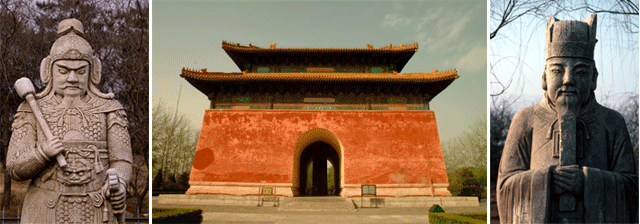
Joyce Wang – many Chinese who deal with foreigners adopt an English first name for purely practical reasons – our enthusiastic, slightly plump Chinese guide took us on a tour of the tombs. She explained to us, how the Chinese Government had identified that there still remained many tombs underneath the ground where the bodies of emperors had been buried together with priceless treasures – the Ming Emperors were on the same page as the Egyptian Pharaohs – and had decided not to excavate the tombs till such time that conservation technology had made further advances. ‘It’s very difficult to prevent deterioration,’ she explained, ‘once you have dug out things and have had them exposed to the air.’
The British couple with me oohed and aahed appropriately as we wandered about the site, an hours drive from Beijing. They were for the most part as impressed as I was, but on the way back Lisa, who was in her early forties remarked critically on how the passengers stood near to the driver in some of the long red buses that we saw.
‘That would never have been allowed in England,’ she said.
‘Too close?’ questioned Joyce.
Lisa nodded. It may have been my imagination, and her comment may have been perfectly neutral but I thought I detected some smugness there. It was as if she was reassuring herself that they, the British and the West in general were still ahead of the game. Did she realize the numbers the Chinese were up against? A billion plus, and counting. For myself I saw that while the buses had standing passengers they were far from packed, and the traffic flowed smoothly.
The sky had been overcast during much of the day and as our mini bus approached Beijing it began to rain. The previous day I had seen many light Chinese umbrellas unfurled that protected women and elderly people from the heat, but today it was the turn of the heavy-duty umbrellas to be out.
‘Oh, doesn’t he look like Mary Poppins?’ exclaimed Lisa, at a cyclist driving with one arm holding the umbrella and the other one the handlebar of the cycle.
We were to see several men riding bicycles in this fashion. Others wore Chinese style raincoats or capes covering most of the body.
Joyce explained that as Beijing had expanded the number of cyclists, though still considerable, had declined. The distances are too much now to make the cycle as useful as it was in past years.
We stopped on our way back at a Tea House on Maliandao Street to sample some Chinese teas: a hundred shops selling tea on this street with each shop displaying hundreds of varieties for sale. Wen Li, our tea-tasting tutor took us through five different varieties in the space of half an hour. I have never had so much chai in my life in such a short space of time, even if sadly the aroma and flavor lessons taught to us by our delicately featured, youthful tea instructor didn’t remain with me. Fortunately, toilets were near at hand.
Last stop for the day was a tour of the Olympic stadium, which cannot be missed. We drove past the stadiums, as there wasn’t enough time to go inside, but we could see people milling about even at end of the day. Most tourists were Chinese from outside Beijing come to take pride in their country’s achievement, the star attraction being the Water Cube swimming pool and the famous ‘bird cage’ whose girth and shining steel make it truly awesome. These stand witness to China’s prowess in engineering and it’s emergence as a technological power.
Back in the hotel, I relaxed in the room and finished ‘The Bridegroom’, the novel I had begun in the aircraft flying from Hong Kong to Beijing. My favorite story in this collection was ‘The Entrepreneur’, a somewhat satirical tale about the changes in China. A middle aged, ugly looking Chinese entrepreneur in Shanghai receives a stern warning from the Government the first time he buys clothes from a Chinese town and tries to resell them in Shanghai at a profit. Our ugly friend is in love with a lovely Chinese maiden, and tries to have a date with her but she ignores him, and worse still her widowed mother humiliates him. After some years the Chinese Government liberalize their policies and it becomes legal to do this kind of trade. The entrepreneur gets back to business, buying cheap and selling at a profit and soon amasses great wealth. The attitude of the widow and the maiden now changes. He gets married to the girl. However he retains some anger against the mother and the story ends with him contemplating revenge by having his mother-in-law sleep on the same bed with him and his wife!
I discussed this book with Aouda Qian, a young Chinese research student at the Department of Chinese Language and Literature in Peking University, one of the country’s prominent universities. We met briefly for coffee, through the auspices of a common friend, inside the University campus. She was dismissive of Ha Jin.
‘His stories are not about contemporary China,’ she insisted. ‘There have been too many changes in the last ten years. Ha Jin is too Americanized and not in touch anymore with Chinese reality.’
She may have been right, but I sensed resentment bubbling inside her, possibly owing to the harsh and critical tone some of Ha Jin’s stories take while writing of China. Old China still remains, evident in small instances such as the refusal by the hotel cleaning lady, or the girl at the hair-cutting saloon to accept a tip from me. Richard, the Englishman staying at my hotel also spoke of how astonished he had been to find tips refused at certain places. Tipping was formerly understood to be part of bourgeois, capitalist culture, and has yet to find acceptance in many places. Many Chinese are still used to ‘doing their duty’ and taking nothing extra.
And I thought too of how in India, many readers regarded expatriate writers such as Salman Rushdie as similarly not writing authentically about modern India.
Friends were concerned that I would have difficulty with Chinese food. Although Chinese food in India is clearly different from Chinese food in China, I didn’t face any problem, and drank yellow bean juice with interesting Chinese rice and noodle combinations a few times at an inexpensive Chinese restaurant. The one time I did have a problem with food was when I ordered a pizza in my room. The pizza that the hotel offered up was too terrible to describe. I sent it back and went outside to a nearby Pizza Hut. The lesson: you can find several MacDonald’s and Pizza Huts in Beijing but the Chinese have not yet internalized the cooking method of these for them still exotic food items. The bad pizza turned out to be a blessing in disguise; at the Pizza Hut, I befriended two young Chinese company executives in their twenties sitting at the next table. They worked for a French company, spoke reasonably good English, and had decent well-paid jobs.
The following evening I went to watch a Chinese opera with Nica Wu and Gao Sun the two Chinese executives. Nica was small and petite, while Gao was short and paunchy, unusually corpulent for a Chinese. My treat, I insisted.
Nica enjoyed the performance very much, Gao found it reasonably good. Personally, I was disappointed. A contraption mounted at the top of the stage rendered an English translation of what the characters were saying, so I got the gist of the not uninteresting story, about a Chinese queen betraying her husband the King for the sake of her pacifist lover who wished to put an end to some medieval war. For me the acting was poor and the overall dramatization passé.
‘The wording is so beautiful,’ said Nica admitting that the actors were unexceptional. ‘It’s very poetic The English translation cannot get the flavor of the original. The opera itself is wonderful.’
It didn’t match up in my mind to the previous evening’s fascinating performance – an acrobatic show at the Chaoyang Theatre. The Chinese have extraordinarily supple limbs – clearly demonstrated in the Beijing Olympics, despite accusations made that the gymnasts had been underage – and this show is an absolute delight to watch. The yellow ice creams sold by young Chinese girls in bright red uniforms turned out to be salty and the theatre itself was run down but the performances were magnificent. Circus acts that I have witnessed elsewhere pale in comparison.
Last evening in Beijing. I spent it at Bar Street with my new friends Nica and Gao. There are two Bar Streets in Beijing and the one I went to lies close to the Beihai Park, which lies north west of the Forbidden City. Beihai Park itself is well worth a visit. You can climb up the so-called man made mountain – a small hillock really – and take one of the paddleboats running up and down the lake inside that is roughly the size of the lake at Nainital in North India. You don’t have boatmen though as is the case in Nainital; in keeping with recent Chinese history it’s more the do-it-yourself style.
As the evening progressed and as Nica, Gao and I drank our beers we saw Bar Street get more and more crowded. Large numbers of young Chinese turn up at Bar Street to have a good time, especially over the weekend. It is a wonderful place to have a stroll, listen to any of the bands playing jazz and other western tunes inside nicely done up restaurants, and have a few drinks. We sat outside, but inside I could see young people dancing. I saw a couple in their early thirties do something that resembled the Cha-cha-cha, the Latin American dance of Cuban origin. China was indeed changing.
Nica had been to India the previous year and spoke of how impressed she had been.
‘Nah,’ I said, dismissing her statement. ‘It’s true that we have done well, but you guys are ahead in terms of infrastructure and overall development.’
‘What I love about your country,’ insisted Nica, ‘are the people, your culture and the religion.’
‘Religion?’
‘Yes,’ she exclaimed. ‘It’s simply tremendous’; and she went on to talk about what a revelation India with its deeply religious and yet fairly liberal people had been to her. She was planning to visit again as soon as she could.
I was taken aback at her interest. Her companion Gao too evinced interest in Indian religions and wished to know more about them.
Back in the hotel, I reflected on Nica’s fascination with the importance of religion in India. It is true that in India you find religion everywhere, and it is very important for us, but I have sometimes found myself being defensive about it.
China has made immense strides in an economic and scientific sense, but in another sense it is coming out of an intellectual and cultural wilderness. There has been liberalization of the economy, but as yet the communist party still has a firm grip on what else people may think. In the past decades under communist rule, roads and bridges may have been made, agriculture may have been organized, scientific advance may have taken place, but there has still remained a kind of intellectual vacuum. There was great and hidden irony in Mao’s adoption of the term ‘cultural revolution’ for that movement was in a sense about the destruction and suppression of culture, of bourgeois culture it was claimed – but then that was the only culture that existed. Proletarian culture in many instances may have been rudimentary enough to have simply meant saying ‘jai ho’ to the Leader.
Young Chinese who are growing up in a more free society understandably wish to explore the nature of existence not only in physical but also in metaphysical and even mystical terms. In the coming years, there will be a revival of ancient Chinese ritual, but because there is now a kind of vacuum millions of Chinese will turn to alternative religions. People like Nica and Gao are aware of Christianity but are shopping around for alternatives. China will certainly be fertile fishing ground for Christian missionaries, but also possibly for any new and different religions.
07-Feb-2010
More by : Rajesh Talwar